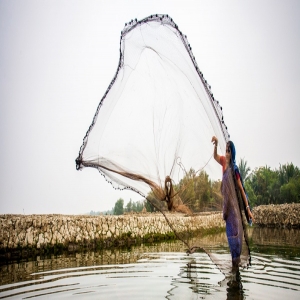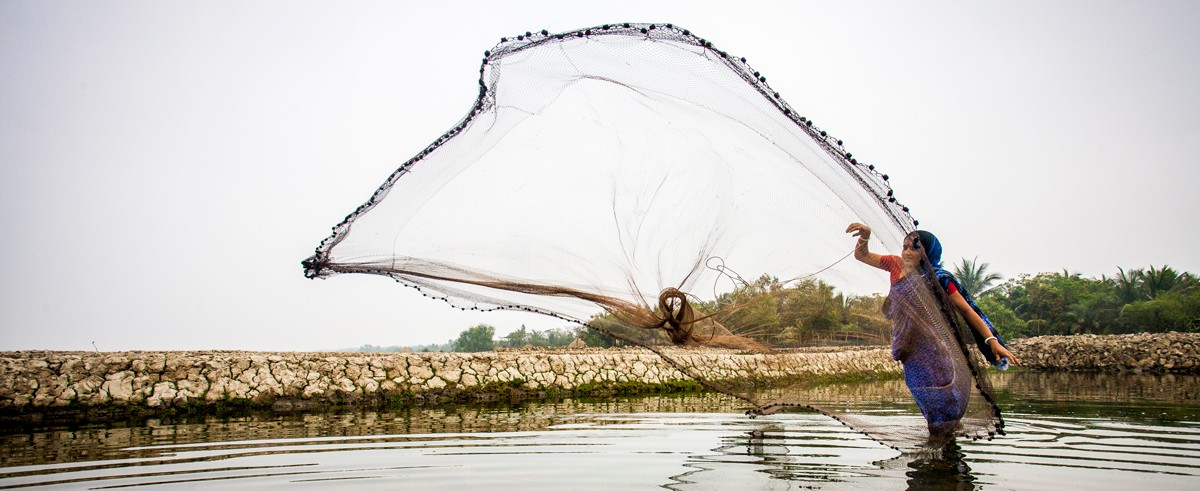
.jpg) Jose Vattakuzhy
Jose Vattakuzhy

On the tranquil beaches of Chavakkad, Thrissur, Kerala, where the Arabian Sea meets the golden shores, lies 'Santhwana Theeram'—an initiative by the Thrissur Archdiocese, serving as a support centre that provides migrant fishermen with a space for rest, prayer, and solace.
Among those who sought facilitation was Gerald, a fisherman from Tamil Nadu. After completing his mechanical engineering degree with hopes for stable employment, Gerald turned to the sea—the craft of his ancestors—when financial hardships and family obligations limited his options.
Every morning, Gerald and his fellow migrants strolled toward the surf, their nets burdensome on their backs and their hearts brimming with doubt. The ocean, acting both as a provider and a detractor, moulded their lives. Even with cultural obstacles and feelings of isolation, friendship flourished among them—encompassing communal meals, joy, and narratives that transcended language and boundaries.
Sadly, at 49 years old, Gerald experienced a deadly heart attack while out at sea, leaving a mourning family without financial aid or assistance.
His tale reflects the quiet hardships and sacrifices of numerous migrant fishermen along India's shores—individuals whose perseverance upholds an essential industry, yet whose existence frequently remains unacknowledged.
History and Commemoration of World Fisheries Day
World Fisheries Day is observed annually on November 21 to highlight the importance of sustainable fishing practices and the well-being of individuals who rely on these resources. The initial observance took place in 1997, following the establishment of the World Forum of Fish Harvesters and Fish Workers (WFF) at a conference in New Delhi.
Since then, the day has focused on promoting awareness about overfishing, pollution, and the ecological balance of marine ecosystems—while also recognising the crucial role of fishing communities in global food security and the economy.
In light of the expanding blue economy, this day also emphasises the need to focus on migrant fishermen — a marginalised community that constitutes a significant portion of India's coastal labour force. In October 2025, the International Labour Organisation (ILO) convened in Geneva to discuss fair labour principles for migrant fishermen, bringing together governments, employers, and representatives of workers from around the world.
The ILO emphasised the enhancement of decent work and equitable labour practices by launching new Guidelines for Fair Labour Market Services, intended for Migrant Fishers. These guidelines aim to address significant issues such as human rights violations, unsafe working environments, and unfair hiring practices by defining specific responsibilities for all stakeholders and establishing a framework for a more secure and respectful fishing industry.
The Significance of Fishermen
Fishermen form the foundation of the fisheries sector, supporting livelihoods, food security, and national economies. Globally, millions depend directly or indirectly on fishing for their sustenance and income.
India, the world's second-largest fish-producing country, contributes about 8% of global fish output. The nation possesses vast resources, including rivers, reservoirs, ponds, wetlands, and an 8,118 km coastline, with a total potential production capacity exceeding 22 million tonnes. Fish production rose from 9.6 million tonnes in 2013–14 to 17.5 million tonnes in 2022–23, marking one of the fastest growth rates in the agricultural sector.
A 2017 study identified 3,288 coastal fishing villages and 1,511 marine landing centres across India, supporting around 4 million active fishers. Fisheries also serve as a major source of affordable animal protein, essential nutrients, and employment in processing, logistics, and trade.
Beyond economics, fishing embodies deep-rooted cultural and traditional knowledge systems that are often passed down through generations. Coastal communities exhibit strong social ties and community-based resource management, demonstrating the integral role of fisheries in both their livelihoods and identities.
Migrant Fishermen in India
Migrant fishermen represent a crucial yet vulnerable section of India's fisheries workforce. Although official statistics remain limited, studies estimate that in Kerala alone, migrants constitute nearly 58% of the marine fisheries labour force, especially in mechanised sectors.
These workers—mostly from Tamil Nadu, Andhra Pradesh, Odisha, and West Bengal—migrate seasonally in search of better catches and higher wages. While migration offers income opportunities, it also exposes individuals to precarious conditions, including isolation, discrimination, and limited access to essential services such as housing, healthcare, and education. Many live in temporary shelters near harbours, enduring long hours and uncertain employment terms.
Their presence underscores the growing dependence of India's industrialised fisheries on migrant labour. Yet, despite their significant contribution to the national economy, they often remain excluded from formal welfare schemes and social protections.
Globally, migrant fishers face similar challenges—precarious employment, debt bondage, language barriers, and limited legal recourse. Addressing these issues is vital not only for social justice but also for ensuring sustainable and equitable fisheries management.
Firstly, the ILO's key instruments regarding migrant workers were Convention No. 97 (Migration for Employment, 1949) and Convention No. 143 (Migrant Workers, 1975), which outline criteria for equitable treatment, social security, and rights, along with the wider UN Migrant Workers Convention (1990) that establishes international human rights standards for migrants.
Nonetheless, India has not ratified any of these ILO international conventions, although it has ratified the wider Maritime Labour Convention, 2006 (MLC, 2006), which establishes general standards for seafarers.
Challenges Confronting Fishermen
Fishermen, particularly small-scale and migrant workers, face a range of persistent challenges, with unsustainable and illegal fishing practices posing a significant threat to the long-term viability of marine ecosystems.
In line with climate change, the rising sea levels, warming oceans, and extreme weather events disrupt fish populations and endanger livelihoods. When it comes to economic insecurity, seasonal income fluctuations, high fuel costs, and market exploitation, many are trapped in cycles of debt.
Additionally, a lack of infrastructure is another challenge, characterised by poor landing facilities, storage, and transportation systems, which lead to significant post-harvest losses. As a result, the occupational risks are high for fishermen. Fishing remains one of the world's most hazardous jobs, with frequent accidents and inadequate safety measures. The study reported these issues due to policy and regulatory gaps. Weak enforcement, fragmented governance, and a lack of representation often marginalise fishing communities in decision-making.
The Indian government has introduced various schemes to strengthen the fisheries sector and support the welfare of fishermen. The Pradhan Mantri Matsya Sampada Yojana (PMMSY) promotes socially inclusive and sustainable development, while the Blue Revolution Programme focuses on integrated fisheries management. The Fisheries and Aquaculture Infrastructure Development Fund (FIDF) provides concessional financing.
Fishermen are also eligible for Kisan Credit Cards and livelihood support during the annual fishing ban period. In 2021–22 alone, nearly 48,500 fishermen received PMMSY assistance during the lean season, reflecting growing efforts toward inclusive growth.
Interestingly, India does not have a comprehensive "migrant fishermen act," Rather, several regulations and initiatives, primarily the Maritime Zones of India (Regulation of Fishing by Foreign Vessels) Act, 1981, and the Inter-State Migrant Workmen Act, 1979, along with specific state laws and various government welfare and safety programs, govern both migrant and other fishermen. This suggests the absence of a system to adequately address the problems faced by migrant fishermen.
Towards a Sustainable Future
As we mark World Fisheries Day, it is time to honour the courage and contribution of fishermen—especially the migrants who brave unfamiliar waters to sustain their families and our food systems. Their resilience embodies both the hope and hardship of the sea.
Ultimately, sustainable fisheries are essential not only for ecological balance but also for human dignity and social justice. To ensure that our oceans, rivers, and lakes remain healthy for future generations, it is essential to establish equitable, secure, and sustainable livelihoods for everyone who relies on the sea.